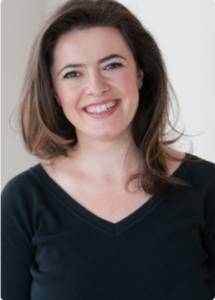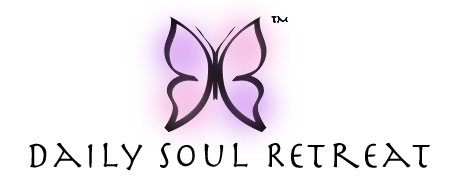"The key to change….is to let go of fear."
– Rosanne Cash
Good morning! I hope you enjoyed a wonderful weekend!! My work on renovating SoulfulLiving.com has taken some exciting twists and turns over the past week and the new website is growing larger and in more fabulous ways that I originally envisioned. I'm very excited!! I hope to unveil the newly remodeled SoulfulLiving.com to you next Monday. And, I’m going to have a special surprise for you this coming Friday! Hee! I just love surprises!!
In keeping with our theme of the month, I'm pleased to share an article about "fear and change" with you today by writer and coach Tara Sophia Mohr. Change is often accompanied by fear, and Tara's terrific article explores two different types of fear and how we relate to fear when we are following our heart's calling and making life changes.
I hope you enjoy her article! ♥
 "Change How You Relate to Fear"
"Change How You Relate to Fear"
by Tara Sophia Mohr
I was on the phone with Mary – a favorite coaching client – talking about what she truly wanted to do next in her life and career. “I want to move to the developing world,” she said, “to Southeast Asia, and I want to work on girls’ education there.”
As she said it, the tears started flowing. She had finally admitted what she really wanted to do. We could both feel – this was it.
For a few moments, Mary basked in the excitement. How good it felt to finally have accessed and articulated what she wanted. How remarkable it would be to make this her next chapter. As we talked, the sense of possibility and power in her voice grew.
Then, about three minutes later, the fear arrived. It came in just like clouds moving in on a clear, bright sky. Mary started to worry: “But I could probably never do that – I’m really not an expert in that area, and I don’t have much relevant experience. And I’m afraid – would I really be able to make it in an environment so different from the one I’m in now?”
As a coach, I’d been trained to expect this. Like most of us, I was quite familiar with the idea, popular in personal growth and spirituality circles these days, that, it’s scary to be your real self and to go for your real dreams, to take the leap and follow a calling.”
So in moments like the one Mary was experiencing, I used to say something like, “Yes, it’s perfectly normal to feel fear when you tap into your authentic self. Living an authentic life and going for your dreams requires leaving your comfort zone, risking failure, and being vulnerable. The risk-averse, primitive lizard brain activates, and fear comes up.”
But then I started to see “fear” differently, as a result of a little known, powerful teaching by the late spiritual Rabbi Alan Lew. It upended the way I understood what Mary – and all of us – experience when we attempt to go for our real dreams.
Rabbi Lew explains that in Biblical Hebrew, there are several different words for fear – not just one, like we have in contemporary English.
In Biblical Hebrew, pachad refers to “projected or imagined fear,” the “fear whose objects are imagined.” That, in contemporary terms, is what we might think of as over-reactive, irrational, lizard brain fear. This is obsessive, unfounded fear of possible worse-case scenarios, of making a fool of ourselves, of horrible rejection. This is the panicked feeling we feel when we step out of our comfort zones.
This is what most of us know as fear.
But there is a second Hebrew word for fear, yirah. Rabbi Lew describes yirah as “the fear that overcomes us when we suddenly find ourselves in possession of considerably more energy than we are used to, inhabiting a larger space than we are used to inhabiting. He explains it is also the feeling we feel when we are on sacred ground. This is the feeling Moses experienced when he encountered the burning bush.
Just think about that: the feeling that overcomes us when we suddenly find ourselves in possession of considerably more energy than we are used to, when we are inhabiting a larger space than we are used to inhabiting, or when we are on sacred ground.
This is the feeling we all experience when we encounter the presence of the divine, whether in the form of a burning bush or in the form of the still, small voice within ourselves. This is what Mary was feeling – as she touched the sacred within herself in that moment of honoring her soul’s desire. This was what Mary was feeling as she became infused with the energy that came from contacting her soul’s desire.
If you’ve felt a calling in your heart, uncovered an authentic dream for your life, or felt a mysterious sense of inner inspiration around a project or idea, you recognize this description of yirah. It feels a lot like fear, but it has a kind of tingling exhilaration to it that regular ol’ pachad fear does not.
We often conflate or confuse the two types of fear, and simply call what we are experiencing “fear.” But we can discern them more closely, and in doing so, more effectively manage fear so it doesn’t get in our way.
Next time you are in a moment that brings fear:
1.Ask yourself: what part of this fear is pachad? Write down the imagined outcomes you fear, the lizard brain fears. Remind yourself that they are just imagined, and that pachad-type fears are irrational. We are best served by becoming aware of – but not taking direction from – the voice of pachad within us.
2. Savor yirah. You can also ask yourself: what part of this fear is yirah? You’ll know yirah because it has that tinge of exhilaration and awe -while pachad has a sense of threat and panic. You’ll know yirah because it will show up when you are touching the sacred – in life, in a relationship, in your work, or within yourself. You’ll know yirah by that sense of inhabiting a larger space – literal or metaphorical – than you are used to. You’ll know yirah by that sense of coming into possession of more energy than you are used to. We are best served by becoming aware of, leaning into – and even looking for – the callings and leaps that bring yirah. We are best served by simply saying “thank you” when we feel the yirah, taking it as a sign that we are on holy ground.
As you move through this spring season of new beginnings and renewal, change your relationship with fear – opting out of listening to the voice of pachad, and welcoming and leaning into yirah.
Copyright Tara Sophia Mohr. All Rights Reserved.
Tara Sophia Mohr is the founder of the Playing Big leadership program for women and the author of The Real Life: Poems for Wise Living. With a deep commitment to amplifying women's voices, Tara's work empowers women to play bigger in their work and in their lives. Visit www.taramohr.com to learn more.
I’d love to hear your thoughts and comments about Tara's article! Please scroll down and leave your comments below.
And, if you haven’t already done so, be sure to pick up your special package of inspirational goodness exclusively for our Daily Soul Retreat Newsletter Subscribers — a “Soul Retreat Gift Pack” filled with over $300 worth of Ecourses, Ebooks, Audio Workshops and Meditations, donated by our awesome SoulfulLiving.com authors. If you aren’t already subscribed, click here for all the details. If you are already subscribed, watch your Daily Soul Retreats for all the details.
Wishing you a wonderful day!
Soulfully,
Valerie












